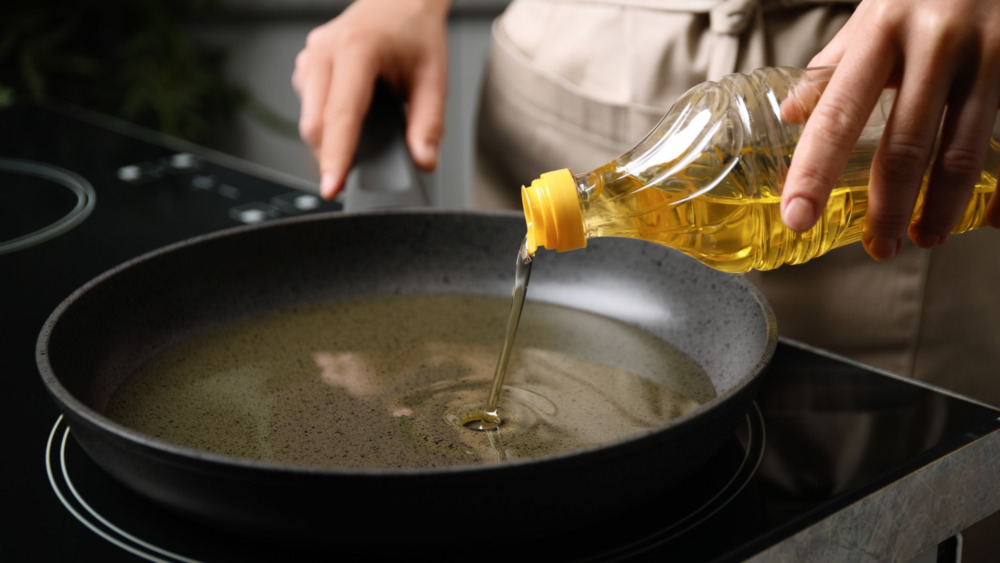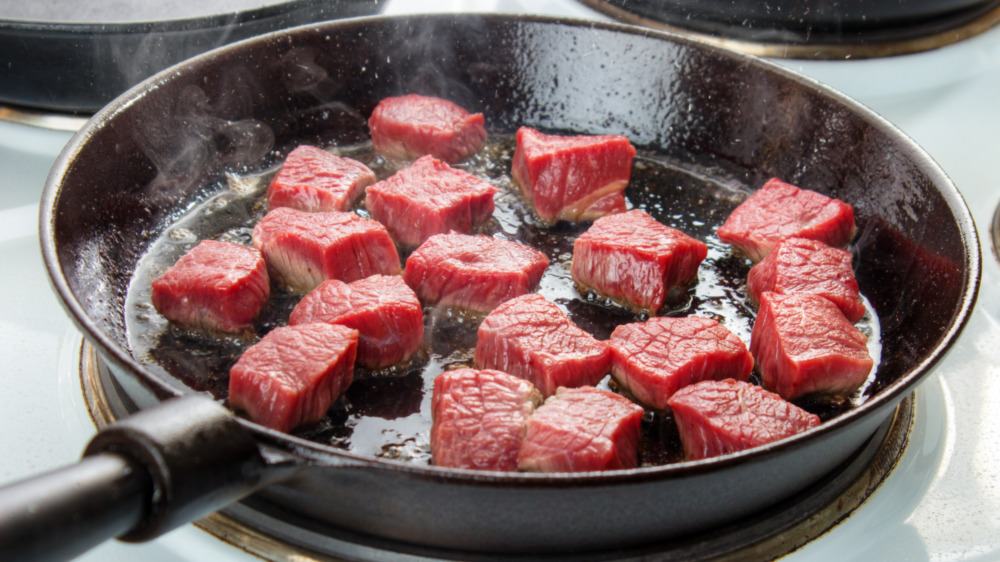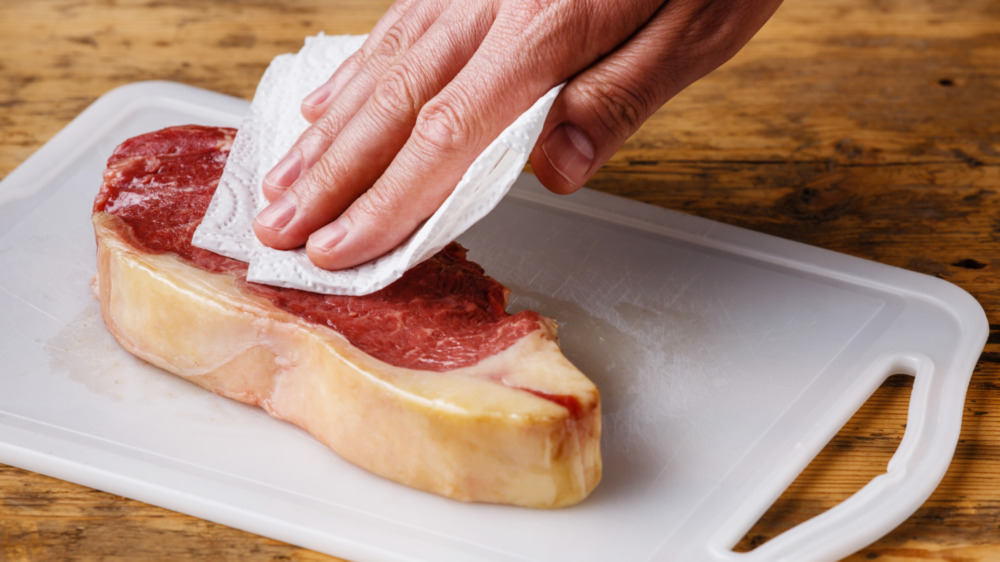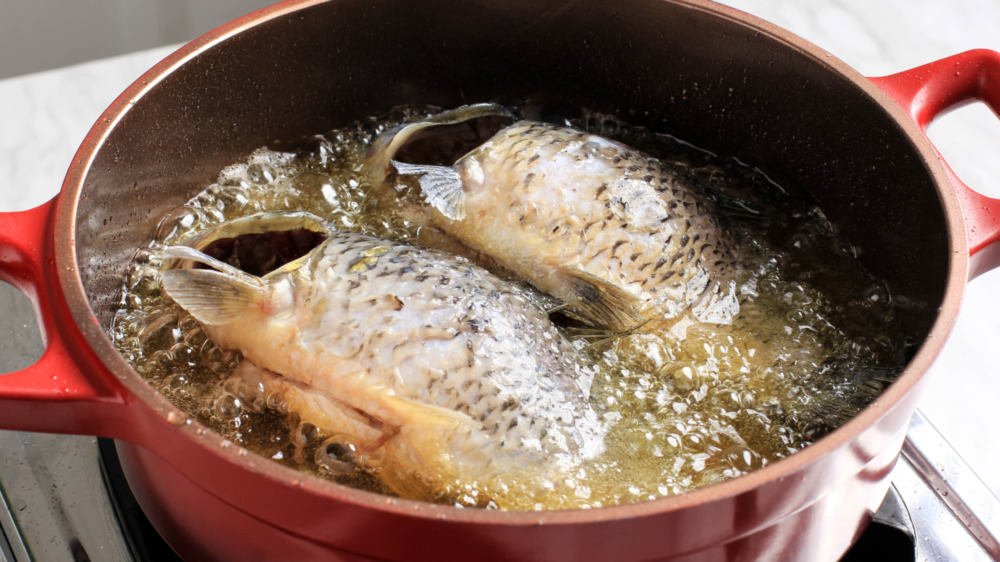This Secret Trick Will Stop Splattering Oil Forever
Whether you're searing salmon or stir-frying cubes of beef, you know the scariest — and messiest — part of the process isn't handling the raw meat or trying to cook it perfectly. Rather, it's the moment when your pan has finally finished preheating and you're about to add the meat. Holding your breath, you slowly place it in the pan — only to be greeted by sizzling hot oil drops shooting off the pan and onto your stove (or worse, onto your bare skin!). It's a common kitchen nightmare, and one that both home cooks and professional chefs have to deal with on the regular.
Sure, you could buy one of those fancy splatter guards to protect yourself and your kitchen, but even they aren't always effective at catching all the droplets. Plus, if you're about to cook right now, you don't have time to wait for Amazon to deliver one to your doorstep. Fortunately, there are a few easier ways to prevent hot oil from splattering when you're cooking on the stove — here's what you need to know to keep your countertops mess-free and your skin burn-free.
Don't add the oil to the pan first
Most of us drizzle our oil into the pan or skillet while it's heating up on the stove. After all, that's what you're supposed to do, right? Well, maybe not if you want to avoid oil splatters. Here's a little science lesson: It isn't the oil itself that spits and explodes out of the pan. Rather, it's the moisture of whatever you're cooking that interacts with the oil, Yummy explains. When the water molecules hit the oil, they create tiny pockets of steam that burst, launching an oil-coated drop up in the air.
A simple way to prevent that, according to a post on Instagram from Cook's Illustrated, is to toss your meat (or veggies!) with the oil before cooking, rather than adding the cooking oil directly to the pan first. "That way, the moisture leaving the meat simply vaporizes in the hot, mostly dry pan," they explained in the caption. So the next time you go to cook with oil, you can easily reduce all those annoying (and painful) oil splatters. This same rule of thumb applies if you're cooking veggies, too.
Dry your food before putting it in the pan
If you're plopping meat straight out of the package into the pan, it's no wonder you're experiencing oil splatters galore. Homemade Recipes explains that it isn't the oil itself that causes spits and explosions — it's the interaction of water droplets with the hot oil. So when a dripping piece of chicken gets dropped into sizzling oil, it's a veritable fireworks show.
An easy way to prevent this from happening is by patting your meat — or any type of wet food for that matter — dry with a paper towel or clean cloth towel before putting it in the pan, as Kitchenicious recommends. The blog adds that if you're cooking anything with a marinade or sauce, you should let excess moisture drip off before placing it in the oil. And before you even put the oil in your pan to start cooking? Make sure it's completely dry and there's no water droplets left from when you washed it. This will minimize the risk of splattering as the oil heats up.
Use the right size pan
Most people blame the oil — it's too hot, the wrong type, etc. — or the food being fried for the onslaught of sizzling hot splatters. But one thing that's also a factor? The size of the pan you're putting said oil and food in. Kitchenicious recommends picking a deeper pan with higher sides that are more likely to keep oil contained, even if some happens to splash up. The culinary blog adds that it isn't just size and shape that can make a difference — you should consider the type of cookware you're using, too. A pan that distributes heat more evenly, like stainless steel or aluminum, is less likely to cause your oil to spit out onto your stove.
Don't have a pan with sufficiently high sides? Lifehacker notes you can invest in a silicone "frywall," which is essentially like a collar that wraps around the edge of your pan to add more height (and more importantly, more protection). Of course if you're still struggling with splatters, you can put up a splatter guard, cover your pan with a lid, or even use an old baking sheet as a makeshift barrier between the oil and the rest of your kitchen.



